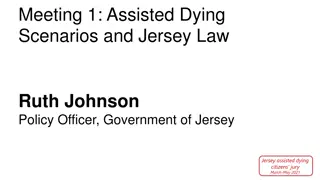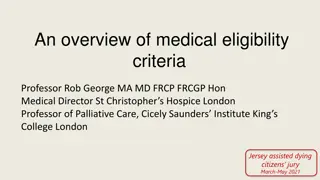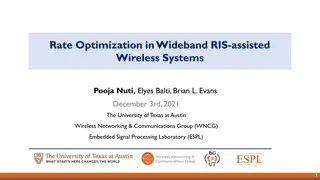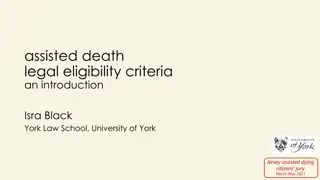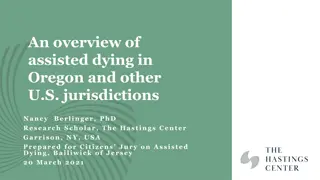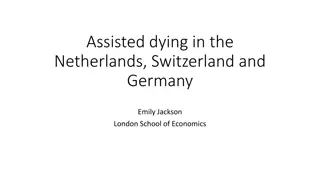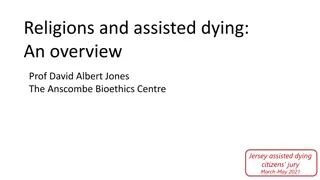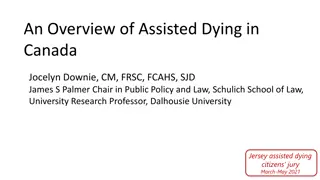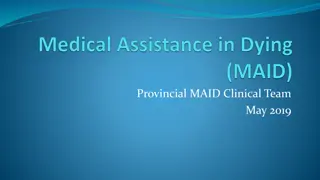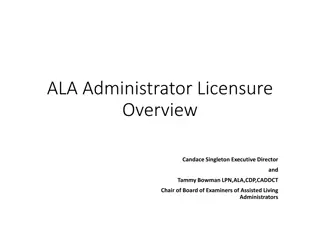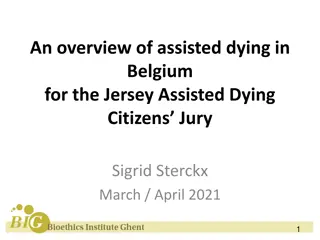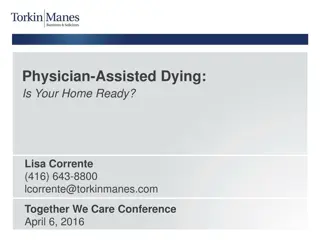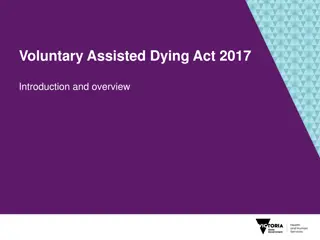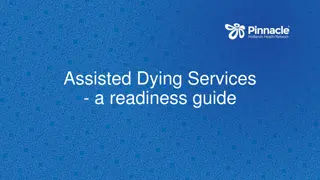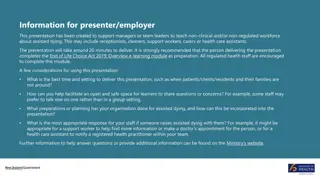Assisted Dying Scenarios and UK Law Overview
Explore scenarios related to assisted dying, including euthanasia, physician-assisted suicide, and treatment withdrawal, within the context of UK law (excluding Scotland). The scenarios depict situations where individuals are facing end-of-life issues and the legal implications of their choices. Learn about the current laws in England, Wales, and Northern Ireland regarding assisted suicide and euthanasia, highlighting the complexities and ethical considerations involved.
Download Presentation

Please find below an Image/Link to download the presentation.
The content on the website is provided AS IS for your information and personal use only. It may not be sold, licensed, or shared on other websites without obtaining consent from the author.If you encounter any issues during the download, it is possible that the publisher has removed the file from their server.
You are allowed to download the files provided on this website for personal or commercial use, subject to the condition that they are used lawfully. All files are the property of their respective owners.
The content on the website is provided AS IS for your information and personal use only. It may not be sold, licensed, or shared on other websites without obtaining consent from the author.
E N D
Presentation Transcript
Meeting 1: Assisted Dying Scenarios and UK Law (excluding Scotland) Professor Suzanne Ost (Lancaster University) Dr Alexandra Mullock (University of Manchester) Jersey assisted dying citizens jury March-May 2021
Scenario 1: Euthanasia Jayne is nearing the end of life, suffering from a very painful condition such as rheumatoid arthritis. On numerous occasions, Jayne asks her doctor to end her life as the medication and treatment she is receiving is not alleviating her pain and suffering. The doctor finally agrees to end her life and administers an injection containing enough diamorphine to be a lethal dose. Jayne dies.
Scenario 2: Physician Assisted Suicide Jack is suffering from motor neurone disease (MND) and his condition has deteriorated rapidly over the last few years. Jack considers that he no longer has any quality of life because of his condition and he wishes to die. However, he is physically unable to take his own life. He asks his doctor to help him to die. His doctor provides Jack with barbiturate pills and stays with Jack as he takes the pills. Jack dies.
Scenario 3: Assisted Suicide Because of a serious accident a year ago, Daisy is suffering from paraplegia and is completely paralysed from her neck down. She considers that she has no quality of life and the prognosis is that her condition will not improve. She contacts the Swiss right-to-die organisation Dignitas and starts the process of an assisted death with them. Her husband has agreed to pay for the flight and to accompany her. Seven months later, Daisy travels to Switzerland and is given barbiturate pills by the Dignitas nurse to end her life, which she swallows with water. Daisy dies with her husband at her side.
Scenario 4: Treatment Withdrawal Following a road traffic accident two years ago, Daniel was diagnosed as being in a vegetative state. He has no conscious awareness and the prognosis is that this is permanent. He is receiving clinically assisted nutrition and hydration through a feeding tube inserted through his nose. The medical team caring for Daniel and his family agree that it is not in his best interests to continue to receive treatment and his treatment is withdrawn. He dies a week later.
UK Law (England, Wales, Northern Ireland) Both assisted suicide and euthanasia are unlawful (The same is true in Scotland but they have their own laws on this issue) 1. Euthanasia: Euthanasia (active killing) is regarded as murder. On conviction, a defendant will receive a mandatory life sentence.
Euthanasia (murder) The law of murder takes no account of motive or consent. Neither compassion nor the consent/request of the victim is relevant to liability, although it would impact the length of sentence (life tariff) on conviction.
Assisted Suicide The Suicide Act 1961 prohibits encouraging or assisting the suicide, or attempted suicide, of another. On conviction, the maximum sentence is 14 years. Prosecutions are very rare: 2009-2020: 162 cases referred to Crown Prosecution Service, 107 not proceeded, 32 withdrawn, 3 convictions, 1 acquittal, 9 cases referred on (other serious crimes, e.g. homicide),7 ongoing cases, see: https://www.cps.gov.uk/publication/assisted-suicide
Assisted Suicide: Policy and Practice Crown Prosecution Service: Policy for Prosecutors Public interest factors tending in favour of prosecution, e.g.: The victim was under 18, or lacked capacity, or had not reached a clear or settled decision to die. The suspect pressured the victim, or was not wholly motivated by compassion Factors tending against prosecution, e.g.: The victim had reached a voluntary, clear and settled decision to commit suicide. The suspect was wholly motivated by compassion, sought to dissuade the victim and provided only minor assistance.
Jersey assisted dying citizens jury March-May 2021












